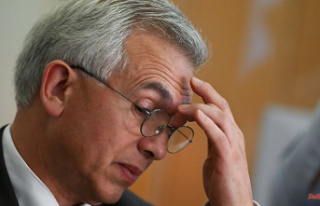Lower Saxony is about to get a red-green state government again. A previous alliance of this kind from 2013 to 2017 came to an abrupt end after a change of party. The agreement within both parties is now there, on Monday the coalition agreement is to be signed.
After the SPD, the Greens in Lower Saxony also approved the planned red-green coalition in the state. The red-green state government in Lower Saxony is thus taking shape. Both partners now want to sign their coalition agreement tomorrow, Monday. One day later, the state parliament meets for its constituent session. Then Prime Minister Stephan Weil should be re-elected. The SPD politician is about to enter his third term. In addition, the cabinet is sworn in.
In the state elections on October 9, the SPD was clearly the strongest party with 33.4 percent, ahead of the CDU. With 14.5 percent, the Greens had their best result so far in Lower Saxony. The plans for the new state government provide for the SPD to have six ministers in addition to Prime Minister Weil and the Greens to have four departments.
Interior Minister Boris Pistorius and Social Affairs Minister Daniela Behrens remain in office for the SPD, while Olaf Lies is moving from the Environment Ministry to the Economics Ministry. Kathrin Wahlmann (justice), Falko Mohrs (science and culture) and Wiebke Osigus (federal government and Europe) will move into the cabinet. For the Greens, the top candidate Julia Willie Hamburg is to become Minister of Education, Christian Meyer the Environment Minister, Gerald Heere Finance Minister and Miriam Staudte Agriculture Minister.
The special party conference of the SPD lasted less than two hours on Saturday, while the Greens needed significantly longer on Sunday. Prime Minister Weil explained that the SPD did not have to make any significant compromises in the negotiations. You differ from the Greens in nuances, but not fundamentally. In the SPD debate on the coalition agreement, only a few party members spoke up, and criticism was limited. There was one dissenting vote in the SPD vote.
In the Greens' vote on the coalition agreement, there were several dissenting votes and abstentions. There was criticism, for example, with a view to dealing with a new construction of the A20 coastal motorway. After a compromise with the state executive, the Greens said they wanted to work with the federal government to ensure that freeways and trunk roads such as the A20/A26, A39 and A33 North are not built because they are harmful to the climate.
Prime Minister Weil had already ruled together with the Greens in his first term (2013-2017). However, this cooperation came to an unforeseen end when a Green MP switched to the CDU in the summer of 2017 and the SPD and Greens lost their narrow majority. After the new election, the SPD has governed with the CDU. However, Weil had always emphasized that renewed cooperation with the Greens was his desired alliance.
This time, the official coalition negotiations only lasted a few days. The topics that Rot-Grün want to implement include a state-wide local transport ticket for schoolchildren, trainees and volunteers for 29 euros a month, a higher starting salary for many teachers and the establishment of a state-owned housing company that is intended to create more affordable living space.
However, the first major project is to be a relief package in the energy crisis. Weil confirmed on Saturday that a supplementary budget for financing is to be launched this month. The package is expected to be around one billion euros. Among other things, this is intended to support small and medium-sized companies, but also cultural and sports facilities as well as the health and care sector.












